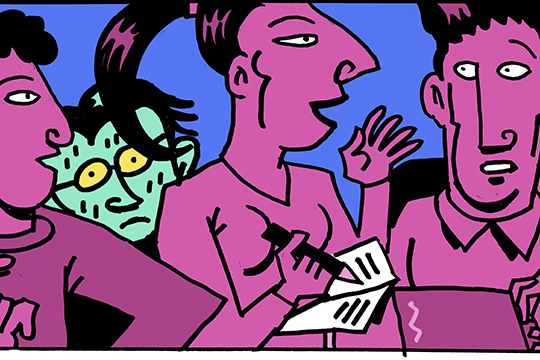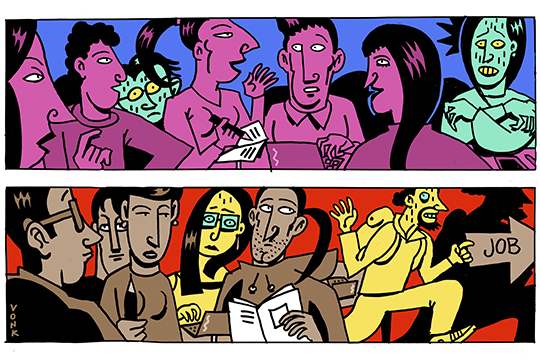“It feels like kindergarten”, second-year student Lisa (not her real name) states. In her study program MKDA (media, art, design and architecture) part of the grades are determined by participation in the lectures.
“Sometimes it’s flat out embarrassing: our names are read aloud and we have to put our hand up”, Lisa says. “It has led to a situation in which students are physically present, but go online shopping during lectures”, second-year MKDA Ksenija Ustinoviča adds.
No leaning back
Most study programs at VU require some form of mandatory attendance. For some programs this makes sense: one cannot become a surgeon without attending dissection courses and for a degree in chemistry, lab experience is key. But how about more theoretically oriented disciplines?
The bachelor MKDA has had an international track for almost 2 years.
The program has grown rapidly since then: from 50 first-year students in 2020 to 130 in 2022.
About two thirds of the MKDA students are internationals. Most MKDA subjects have a mandatory attendance rate of eighty percent, which means students can miss two sessions per subject.
“We want to stimulate students to participate actively, not to lean back and listen to their professors”, MKDA program director Katja Kwastek says. “We think it is important that our students learn to express themselves in a group and learn to collaborate, since these are skills they will need in their future careers.”
First-year student May (not her real name), however, feels there’s a lack of balance. “About seventy percent of the assignments come in the form of group projects.” She suffers from social anxiety disorder, which sometimes makes it hard for her to come to class and do the required group work. It doesn’t help that the groups are sometimes as big as nine or ten people.
Finding time to meet with such a big group is hard, the students note, since many of them also have side jobs or live far away from campus. “The MKDA program is not designed in an inclusive way since it does not take into account individual reasons why students cannot always be present at VU”, Ustinoviča says. “And it doesn’t feel right to have to inform every teacher about the mental health nuances of each student.”
One size fits all
It is a fact that the student population has gotten more diverse in the last few years, especially in international programs like MKDA. Some students take care of family members, need time to visit family and friends abroad, have to travel quite far to come to VU Amsterdam, deal with physical or mental issues or run into difficulties due to a ‘different’ cultural background. VU prides itself for being a diverse university, but with mandatory classes increasingly becoming the norm, it leaves the impression of a one-size-fits-all system.
Could an idea be to opt for hybrid education forms and leave it to the students themselves to achieve the level needed to get a degree? Dick Stuut, board member of student union SRVU, thinks so: “Students are adults, they should decide for themselves if they want to attend classes. At the end of the day, it’s them that suffer the consequences if they fail the exams.”
Freek Schmidt, vice-dean of the Faculty of Humanities, says the faculty has learned through experience that students who attend less than eighty percent of the classes often fail to get the required level. And the experiences with hybrid forms of education – giving students the option to attend lectures live or online – are not great at his faculty.
However, he does notice that students approach their studies differently than a few years back. “More students have a job next to their studies. This might lead to a system in which we offer more programs on a part-time basis, or move to a system with certificates for independent subjects. At a central level, VU is looking for ways to develop more flexible types of programs.”
‘Extremely elitist’
“But in the current situation, the study load of a curriculum like MKDA is still full-time with forty hours a week”, Kwastek remarks. “That is what students get credits for.”
SRVU board member Stuut finds the argument that a study requires full-time commitment “an extremely elitist viewpoint.” “Who can afford not to have a job nowadays with the current rents and cost of living?”, he says.
Mandatory attendance and group work make it harder to fit in a job. Another complication is that the lecture schedules change every few weeks, the students complain.
“Mandatory excursions are sometimes planned in a different city on lecture-free days, sometimes even at the last minute. This makes it increasingly challenging to secure shifts at my job”, Lisa says.
Ustinoviča adds: “These changing schedules also make it hard to apply for a more serious job that helps your career.” For non-EU students an extra complication arises as they can only get a student loan from DUO if they have a job and work at least 56 hours a month or earn fifty percent of the welfare level.
Text continues after illustration
Personalized care
Diversity within the student population also comes in forms of neurological conditions. First-year student May suffers from social anxiety disorder: “Participating in a group is intimidating to me, especially when I’m in a new environment.” Second-year student Ustinoviča had to go to the GGZ (Dutch mental health institution) and found it “awkward” to mention that to her teachers.
Program director Kwastek suggests students go to the student advisor if they have a mental condition, but is also aware that for some students this threshold is too high. The Faculty of Humanities has set up a system with mentors to guide first-year students and Kwastek and vice-dean Schmidt hope this makes it easier to speak up about the obstacles that bother them. “We know this generation of students has gone through a lot with Covid”, adds Schmidt. “And we are aware that not all these issues are solved yet.”
Sarah Westheim (founder of the brand new Neurodiverse Student Association and third-year bachelor student literature) thinks part of the problem is that that the care packages for neurodiverse students at VU are not personalized enough: “I have ADHD and therefore get extra time for exams, but I don’t need extra time, whereas some other people with ADHD do. Instead, I would be helped with more guidance in managing my study schedule.”
Westheim is ambivalent about eliminating mandatory group assignments: “I know it can be a real challenge for some students, but one needs to learn how to collaborate, since that is a necessary skill in almost any career path.”
Next year, Westheim will be vice-chair of the student council and will put her effort into getting a more personalized approach to students.
Unnecessary questions
In the MKDA program, courses not only require physical attendance, but also grade students for their participation in class. SRVU board member Stuut states that grading students based on their participation is ridiculous. “It’s not based on measurable criteria at all and should stop as soon as possible.”
He remembers a course in his own study program in which student participation was measured by artificial intelligence based on how students read and commented on a text. “It led to all kinds of forced remarks, since students had to find a way to show their involvement.”
Ustinoviča has the same experience at MKDA: “Since we get a grade for participation, students ask a lot of unnecessary questions, just to show how involved they are.”
It also still isn’t clear to her how one gets a high grade for participation. “I am not satisfied with just a passing grade, but I think it is impossible to get the highest grade for participation. This way, the participation grade often lowers your overall grade.”
A low participation score in itself will never lead to failing a course, Kwastek states. It can however provide students with a lower overall grade. “But I am against giving a student who has shown zero participation in class the highest possible grade based on exam results only. Participation is an integrated part of the study program and I stand behind that.”
Two of the three MKDA students wanted to remain anonymous. We named them Lisa and May. Their real names and details are known to the editors.

